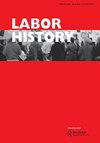The formation of Ezker Sindikalaren Konbergentzia: radical unitary unionism in the Basque Country and Navarre
IF 0.7
4区 管理学
Q1 HISTORY
引用次数: 0
Abstract
ABSTRACT The origin of the union ESK (Ezker Sindikalaren Konbergentzia) took place in the context of the Spanish Democratic Transition in the Basque Country and Navarre, when many radical unions and political parties emerged and disappeared. Its survival may help us trace better the effectiveness of union renewal strategies. Characterized by high conflict and mobilization rates at the company level, ESK militants sought to promote direct action and horizontal organizational structures standing at the opposite end of the model promoted by the new brand CCOO (Comisiones Obreras). The origin and development of ESK cannot be understood without the parallel analysis of the communist political party EMK (Euskadiko Mugimendu Komunista). ESK turned out to be the most effective and long-lasting materialization of EMK’s strategy of mass politics, and of what we conceive as a form of ‘integral militancy’ that is reflected in the immersion of union activists in ecologist, feminist, internationalist and anti-NATO struggles among others. EMK had a significant role in the promotion of unitary candidacies during the late 1970s and early 1980s, becoming the consolidation of a non-independentist non-centralized radical union model that continues to be referential among Basque struggles today.Ezker辛迪加Conbergentzia的形成:巴斯克国家和纳瓦拉的激进统一统一主义
摘要ESK(Ezker Sindikalaren Konbergentzia)联盟的起源是在巴斯克和纳瓦拉的西班牙民主过渡时期,当时许多激进的工会和政党出现和消失。它的生存可能有助于我们更好地追踪工会复兴战略的有效性。ESK武装分子的特点是公司层面的高冲突率和动员率,他们试图促进直接行动和横向组织结构,与新品牌CCOO(Comisiones Obreras)倡导的模式相反。如果没有共产党EMK(Euskadiko Mugimendu Komunista)的平行分析,就无法理解ESK的起源和发展。事实证明,ESK是EMK大众政治战略的最有效、最持久的具体化,也是我们所认为的一种“整体战斗力”的体现,这反映在工会活动家沉浸在生态学家、女权主义者、国际主义者和反北约斗争中。在20世纪70年代末和80年代初,EMK在促进统一候选人制度方面发挥了重要作用,成为非独立、非中央集权的激进联盟模式的巩固者,这种模式在今天的巴斯克斗争中仍然具有借鉴意义。
本文章由计算机程序翻译,如有差异,请以英文原文为准。
求助全文
约1分钟内获得全文
求助全文
来源期刊

Labor History
Multiple-
CiteScore
1.00
自引率
28.60%
发文量
44
期刊介绍:
Labor History is the pre-eminent journal for historical scholarship on labor. It is thoroughly ecumenical in its approach and showcases the work of labor historians, industrial relations scholars, labor economists, political scientists, sociologists, social movement theorists, business scholars and all others who write about labor issues. Labor History is also committed to geographical and chronological breadth. It publishes work on labor in the US and all other areas of the world. It is concerned with questions of labor in every time period, from the eighteenth century to contemporary events. Labor History provides a forum for all labor scholars, thus helping to bind together a large but fragmented area of study. By embracing all disciplines, time frames and locales, Labor History is the flagship journal of the entire field. All research articles published in the journal have undergone rigorous peer review, based on initial editor screening and refereeing by at least two anonymous referees.
 求助内容:
求助内容: 应助结果提醒方式:
应助结果提醒方式:


